

Toxic pesticides being sprayed on airline passengers. (NaturalHealth365) Have you ever felt sick after flying, only to assume it’s jetlag or a virus you picked up from another passenger?
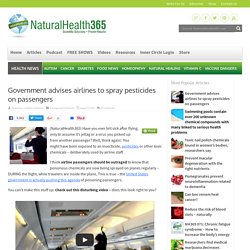
Well, think again! You might have been exposed to an insecticide, pesticides or other toxic chemicals – deliberately used by airline staff. I think airline passengers should be outraged to know that poisonous chemicals are now being sprayed on planes regularly – DURING the flight, while travelers are inside the plane, This is true – the United States government is actually pushing this agenda of poisoning passengers. German Supermarket Chain Bans Bee-Killing Neonic Pesticides on Produce. Christina Sarich, Natural SocietyWaking Times The New Year starts with more positive news.

Aldi Süd, a German supermarket chain with stores in the U.S., has become the first major European retailer to ban pesticides toxic to bees, including the neonicotinoids imidacloprid, clothianidin, and thiamethoxam, from all produce sold in their stores. [1] Chemical Banned Nearly 30 Years Ago Linked to Parkinson’s Disease. By Julie Fidler | Natural Society A new study links a pesticide (organochlorine pesticides) used by farmers (until it was banned for commercial sale in the U.S. in 1988) to the development of Parkinson’s disease in people who were exposed to it.
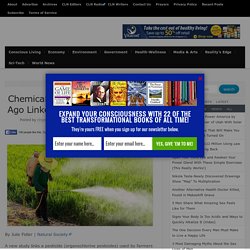
Earlier studies found a link between the neurodegenerative disorder that affects motor neurons in the brain and the consumption of dairy products, but there was little evidence as to how milk, cheese, and other dairy products might increase a person’s risk for Parkinson’s. Scientists hypothesized that chemicals in cows’ milk might be responsible. EPA Intentionally “Fudged The Numbers” To Make Poisonous DOW Chemical Appear Safe. Photo: Wikimedia Commons A recent report from the Chicago Tribune revealed that the US Environmental Protection Agency intentionally obfuscated data and changed their own standards so they could allow an unsafe chemical made by DOW to get an acceptable rating.

After the EPA approved the chemical, a number of environmental groups including the Center for Food Safety and Earthjustice quickly sued the agency, forcing them to retract their approval several months later.
Roundup’s Lesser-Known Cousin Is Coming to a Farm Near You. Pick Again: Pesticide-Laden Fruit Found To Cause Infertility. Organic food IS better, even if just for the reason that it means reduced consumption of pesticides, and in effect, better hormone balance.
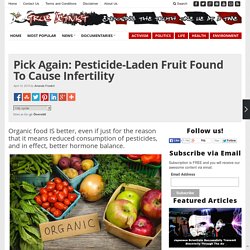
Credit: RogueHealthandFitness According to a recent study, yes, obtaining organic produce really does matter, at least for the reason that it contains less chemicals and pesticides. When Harvard T.H. Chan School of Public Health in Boston conducted a study on the pesticide contaminants found on fresh fruit, they found that the residue left on both fruits and vegetables is lowering sperm counts. For the study, researchers used the USDA Pesticide Data Program to determine which out of over 30 different types of fresh fruits and vegetables had the most pesticide residue.
Credit: HuffingtonPost. The Complete List of Wines In Pennsylvania That May Contain Poisonous Arsenic. By Feroze Dhanoa (Patch Staff) A class-action lawsuit filed Thursday claims that many inexpensive brands of wine contain illegal and dangerously high levels of poisonous inorganic arsenic.
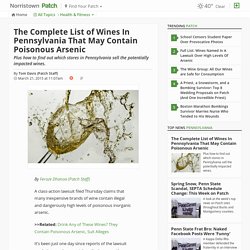
>>Related:Drink Any of These Wines? They Contain Poisonous Arsenic, Suit Alleges. Have You Discovered the Dirty Little Secret of Almonds? Barbara Minton, Natural SocietyWaking Times.

What Parents Need To Know About Monsanto: “By 2025 One In Two Children Will Be Autistic” “Children today are sicker than they were a generation ago.
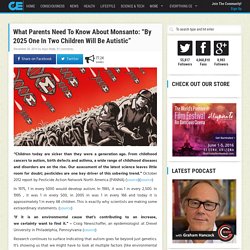
From childhood cancers to autism, birth defects and asthma, a wide range of childhood diseases and disorders are on the rise. Our assessment of the latest science leaves little room for doubt; pesticides are one key driver of this sobering trend.” October 2012 report by Pesticide Action Network North America (PANNA) (source)(source) Obama Regime Silent As Massive Polio Outbreak Sweeps America. Monsanto Loses GMO Permit In Mexico – Judge Sides With The Bees. The 15 Cleanest and 12 Most Pesticide-Laden Produce of 2014. Mike Barrett | NaturalSociety | 30th April 2014 It is no secret that conventional produce is soaked with health- and environmentally-hazardous pesticides.
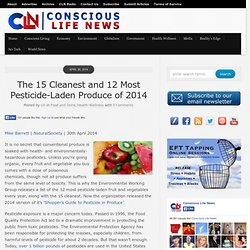
Unless you’re going organic, every fruit and vegetable you buy comes with a dose of poisonous chemicals, though not all produce suffers from the same level of toxicity. This is why the Environmental Working Group releases a list of the 12 most pesticide-laden fruit and vegetables every year, along with the 15 cleanest. Now the organization released the 2014 version of it’s ‘Shopper’s Guide to Pesticide in Produce’. Pesticide exposure is a major concern today.
7 Dodgy Food Practices Banned in Europe But Just Fine Here. Last week, the European Commission voted to place a two-year moratorium on most uses of neonicotinoid pesticides, on the suspicion that they're contributing to the global crisis in honeybee health (a topic I've touched on here, here, here, and here).

Since then, several people have asked me whether Europe's move might inspire the US Environmental Protection Agency to make a similar move—currently, neonics are widely used in several of our most prevalent crops, including corn, soy, cotton, and wheat.